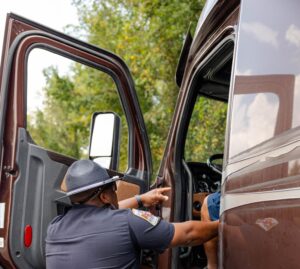LAS VEGAS — A blast-furnace is superheating air across the west.
Emergency room doctors are witnessing the effects, as dehydrated construction workers, passed-out elderly residents and others suffered in an intense heat wave threatening to break Las Vegas’ all-time record high of 117 degrees Fahrenheit this weekend.
Few places in the scorching Southwest demonstrate the surreal contrast between indoor and outdoor life like Las Vegas, a neon-lit city rich with resorts, casinos, swimming pools, indoor nightclubs and shopping. Tens of millions of others across California and the Southwest, were also scrambling for ways to stay cool and safe from the dangers of extreme heat.
“We’ve been talking about this building heat wave for a week now, and now the most intense period is beginning,” the National Weather Service wrote Friday.
Nearly a third of Americans were under extreme heat advisories, watches and warnings. The blistering heat wave was forecast to get worse this weekend for Nevada, Arizona and California, where desert temperatures were predicted to soar in parts past 120 degrees Fahrenheit during the day and remain in the 90s overnight.
Meteorologists in Las Vegas warned people not to underestimate the danger.
“This heatwave is NOT typical desert heat due to its long duration, extreme daytime temperatures, & warm nights. Everyone needs to take this heat seriously, including those who live in the desert,” the National Weather Service in Las Vegas said in a tweet.
Phoenix marked the city’s 15th consecutive day of 110 degrees Fahrenheit or higher temperatures on Friday, hitting 116 degrees Fahrenheit by late afternoon, and putting it on track to beat the longest measured stretch of such heat. The record is 18 days, recorded in 1974.
“This weekend there will be some of the most serious and hot conditions we’ve ever seen,” said David Hondula the city’s chief heat officer. “I think that it’s a time for maximum community vigilance.”
The heat was expected to continue well into next week as a high pressure dome moves west from Texas.
“We’re getting a lot of heat-related illness now, a lot of dehydration, heat exhaustion,” said Dr. Ashkan Morim, who works in the ER at Dignity Health Siena Hospital in suburban Henderson.
Regional health officials in Las Vegas launched a new database Thursday, July 13, to report “heat-caused” and “heat-related” deaths in the city and surrounding Clark County from April to October.
The Southern Nevada Health District said seven people have died since April 11, and a total of 152 deaths last year were determined to be heat-related.
Temperatures closer to the Pacific coast were less severe, but still made for a sweaty day on picket lines in the Los Angeles area where actors joined screenwriters in strikes against producers.
In Sacramento, the California State Fair kicked off with organizers canceling planned horseracing events due to concerns for animal safety.
Employers were reminded that outdoor workers must receive water, shade and regular breaks to cool off.
Truck drivers, even in air-conditioned cabs, are also vulnerable to high heat, especially if working out on docks or in freight yards.
Effects on truckers
TCI Dedicated Leasing and Rental offers the following tips for truckers to stay safe — and cooler — during the high heat of summer.
Hydrate
While this may seem like a no-brainer, long-distance trips often result in dehydration. When focusing on reaching a destination, it’s easy to forget to drink ample amounts of water. However, staying hydrated is the first line of defense against headaches, sluggishness, and lack of focus.
To make sure you’re never without good hydration options, be sure to keep extra bottles of water in easy reach while driving. If you’re in the habit of drinking soda, coffee, or energy drinks instead, challenge yourself to drink more water–even if it means trying sugar-free additions to your water, like lemon juice or fruit flavoring.
Wear sunscreen
Truckers often get sunburned on their left arm due to the long hours spent behind the wheel. This condition is known as “Driver’s Tan” or “Trucker’s Arm.”
While it can look a little funny, it’s actually quite serious.
The dangers associated with sunburn are well known, but many drivers believe their windshields will keep them safe from dangerous UV rays. Ultimately, windshields only provide a small degree of UV protection, which is why sunblock is recommended when driving long hours. Wearing sunglasses and long sleeves offer even more protection from sun exposure, both inside and outside of your cabin.
Stay cool and protected
Staying cool while driving can reduce the risk of heat fatigue, whether you’re making a long-haul or regional delivery. Running the air conditioner is a great option, as is wearing neck cooling wraps or a dampened bandana. Additionally, if the seats are leather or vinyl, make sure they are covered with blankets or towels to keep them comfortable and cool.
Wear lightweight clothing
The type of clothing you wear can make a huge difference in your comfort level. Wear things made of breathable materials such as cotton or linen. These fabrics are lightweight, comfortable and allow heat to escape from the body.
Keep extra clothes on hand and, when possible, try taking cool showers to help you revitalize from head to toe. If you are in an area where nights get cold, or if you’re traveling from one temperature to another, remember to wear multiple thin layers so you can dress up or down depending on the weather.
Take breaks
Whenever possible, take a break. Even a few minutes of downtime will help you feel re-energized. This might involve anything from resting your eyes for a bit or stretching your legs to grabbing a bite to eat. Taking the time to explore the areas you’re driving through will also help make your trips more memorable and fulfilling, especially as the months go by.
Eat healthy
Along with the heat of summer is the wide variety of fresh fruits and vegetables available. Eating foods like cucumbers, watermelon, berries, and tomatoes are packed with beneficial vitamins and minerals and also help hydrate the body.
Caring for your truck
Just as important as self-care is proper truck maintenance and precautions. The high temperatures increase the chances of things like tire blowouts and lack of brake friction. Conversely, the summer months often mean more travelers taking vacations. With this in mind, be sure to allow extra travel time and stay alert at all times. Here are a few suggestions to keep your truck in tip-top shape.
Check brakes
Pavement absorbs heat as temperatures rise, and brake parts can only absorb so much heat. Check your brakes regularly, as high heat can reduce friction and stopping power.
Be diligent about routine maintenance
Regular truck maintenance will help prevent heat-related issues. For instance, just as you need to stay cool during hot temperatures, so does your truck. Check coolant and oil levels frequently to protect the engine from overheating. Inspecting all belts and hoses is important as well. Also, in order to avoid extreme fuel consumption, make sure all air conditioning components are working properly. This protects you and your truck.
Keep tires properly inflated
Before heading out on your next route, check the air levels in your tires. This is especially important if your tires were under-inflated during the winter months. However, during the summer, tires are more prone to blowouts if air levels are too low.
Be aware of traffic conditions
During the summer months, more people are out and about, making roads more congested. This poses even more danger to truckers, so stay vigilant and take extra precautions when driving in heavy traffic. Take some time to check traffic reports beforehand, and avoid congested areas if possible. Keep in mind that construction zones are also active this time of year. Be extra cautious in these areas to avoid fines and fees.
Watch driving speeds
Avoid driving at high speeds as this can cause the engine to overheat and put additional stress on the tires. High speeds combined with hot temperatures can cause substantial damage to your truck. Taking frequent breaks will allow your truck to cool off and be beneficial to you as well.
The Associated Press contributed to this report.
The Trucker News Staff produces engaging content for not only TheTrucker.com, but also The Trucker Newspaper, which has been serving the trucking industry for more than 30 years. With a focus on drivers, the Trucker News Staff aims to provide relevant, objective content pertaining to the trucking segment of the transportation industry. The Trucker News Staff is based in Little Rock, Arkansas.














